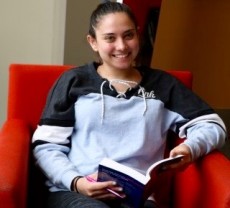A Richter you should know: Nina Codell
 Nina Codell '20
Nina Codell '20
While philosophy never interested this future teacher before, Nina Codell ’20 has found her niche with philosopher Thomas Hobbes and his connection to a particular historical era she also enjoyed in her literary studies.
By working with Assistant Professor of Philosophy and Politics Chad McCracken to research Hobbes for a new course, Codell is discovering the complex world of philosophy and its relation to her areas of study. This English and secondary education double-major is a Richter Scholar you should know.
Q: What drew you to Lake Forest College?
A: “I was drawn to Lake Forest not only for the help with financial aid, but also because of the overall welcoming community and homey, comfortable feel. I’ve most enjoyed the small class sizes and the people, faculty and students, that I’ve met here.”
Q: Tell us about your research project.
A: “My research project under McCracken is all about philosopher Thomas Hobbes. Basically, I’m reading Hobbes’ Leviathan and then locating and reading secondary sources on his work. Hobbes is basically saying that people are bad and destructive and chaotic, so we need government to keep things in check. You have to think of the time he is writing, which is post-Puritans-killing-the-king and the government falling apart in England. I know about this time period from the Shakespeare class I took here, so that’s helpful.”
Q: What has the Richter program been like so far?
A: “I’m enjoying living on campus because I commute during the school year. My friend Hajar is in the program, too, and I’m living in a residence hall with her. What’s hard is getting into Leviathan. In the beginning, Hobbes is writing a lot about how humans think and I’m like ‘I know, I’m a person, too, I get it.’ But I’m excited to keep reading so that I can get to the meaty parts and shape my own opinions about it.”
Q: What is the end goal of your project?
A: “I’m helping McCracken prepare for his class on Hobbes that he will hold in the spring. Half of the project is helping him with this class, but for the other half I need to create my own presentation. I’m not totally sure how I’m going to do that yet, but I might do a presentation connecting Hobbes and Shakespeare because they are from about the same time period and other people have done research along those lines, so there is something to draw on.”
Q: How is it working with a professor?
A: “He gave me a lot of freedom. The topic is a little off the path of what I normally focus on. I feel I will benefit from working closely with a professor, because I will have the opportunity to learn more about certain topics—philosophy and politics—that I have been interested in, but haven’t had time to fully dive into with such a full schedule between English and education requirements.”
Q: How will your experience in the Richter program help prepare you for your future career?
A: “I will be able to apply the theories of Hobbes to my future readings in literature, as well as the way I choose to teach my future classroom be that through accepting or rejecting ‘Hobbesian’ theories. Hobbes has a very cynical perspective, and I don’t plan on centering my classroom around that. Beyond careers, I’m learning that philosophy and understanding certain philosophers better is very helpful in understanding the world I live in, and making decisions about how I choose to perceive my life. It’s very interesting stuff.”
–By Tracy Koenn and Sophie Mucciaccio
